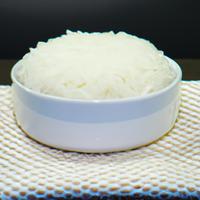
1 serving (100 grams) contains 130 calories, 2.4 grams of protein, 0.2 grams of fat, and 28.2 grams of carbohydrates.

Log this food in SnapCalorie

Nutrition Information
Calories |
260 | ||
|---|---|---|---|
% Daily Value* |
|||
| Total Fat | 0.4 g | 0% | |
| Saturated Fat | 0.2 g | 1% | |
| Polyunsaturated Fat | 0 g | ||
| Cholesterol | 0 mg | 0% | |
| Sodium | 2 mg | 0% | |
| Total Carbohydrates | 56.4 g | 20% | |
| Dietary Fiber | 0.8 g | 2% | |
| Sugars | 0.2 g | ||
| protein | 4.8 g | 9% | |
| Vitamin D | 0 mcg | 0% | |
| Calcium | 20 mg | 1% | |
| Iron | 0.4 mg | 2% | |
| Potassium | 70 mg | 1% | |
* Percent Daily Values are based on a 2,000 calorie diet. Your daily values may be higher or lower depending on your calorie needs.
Food Attributes
Source of Calories
About Short white rice
Short white rice is a type of rice characterized by its small, plump grains and mild, slightly sweet flavor. Commonly used in Asian cuisines such as Japanese, Korean, and Chinese dishes, this rice is known for its soft, sticky texture when cooked, making it ideal for dishes like sushi, rice bowls, and desserts. While primarily consisting of carbohydrates, it provides small amounts of protein and minimal fat. Short white rice is less nutrient-dense than whole-grain options because the bran and germ are removed during processing, reducing its fiber and vitamin content. However, it is easily digestible and can be enriched with vitamins like iron and folic acid in some products. Its high glycemic index means it can cause spikes in blood sugar levels, so moderation is key. Pairing it with vegetables and lean proteins can create more balanced meals for a healthier diet.



